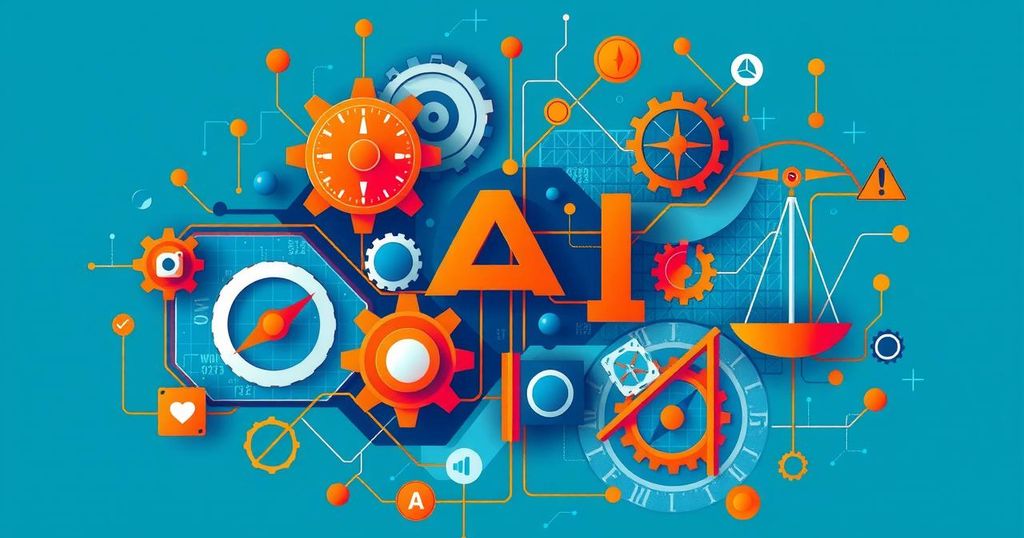Judgment Day is Coming for AI: The Need for Human-Like Judgment
AI is advancing rapidly and showcases remarkable potential, yet it faces limitations in replicating human judgment, intuition, and nuanced decision-making. Despite its capabilities in data analysis and predictions, AI’s lack of personal experience and ethical considerations highlights the necessity for human oversight. The future of AI will depend on integrating life-like experiences to enhance its understanding and decision-making, ensuring it serves as a supportive tool rather than a standalone authority.
The impending Judgment Day for artificial intelligence (AI) looms, highlighting its tremendous potential yet revealing its inability to emulate human-like judgment. While AI excels at rapid outcome predictions, such as forecasting weather, it falls short in the subtle intricacies of decision-making that stem from personal experiences and intuition. Current AI systems, although formidable in data handling, lack the contextual understanding needed for nuanced choices in real-life scenarios.
Even though generative AI can pass complex examinations, such as medical boards or the LSAT, entrusting it with vital roles like being a physician or lawyer is debatable. It remains a sophisticated tool rather than a replacement for professional expertise. GenAI has access to a wealth of information; however, it ultimately functions as a mathematical program, generating outcomes based on probabilities rather than true comprehension.
When asked about the greatest leaders, AI frameworks like Microsoft’s CoPilot have produced contentious lists based on specific criteria. By adhering to a narrow perspective—valuing peaceful resistance—it missed out on many historical figures traditionally recognized for their leadership, demonstrating a fundamental lack of independent judgment. AI’s reliance on curated data highlights its inability to adopt a broader, more inclusive approach to understanding leadership.
The term “artificial intelligence” is a misnomer; it may be more accurately termed “artificial knowledge.” While AI can enhance productivity and precision in myriad fields, the human capacity for insightful decision-making remains unrivaled. Factors such as ethical considerations, personal experiences, and sensory inputs influence human judgment, something AI cannot fully replicate. A combined, learned understanding is crucial, reinforcing the necessity for human oversight in AI-enhanced systems.
AI’s vast knowledge often leads to mediocrity, as it averages out opinions and finds common ground, rather than appreciating the nuances in human experiences. True intelligence in AI will emerge when it learns and evolves over time, developing an understanding of what it means to be human and fulfilling its role as an effective tool for humanity.
The envisioned future includes AI that can engage in life-like experiences, enhancing its decision-making abilities. Such entities should navigate the complexities of life, learning through successes and failures, which is essential for cultivating a true sense of judgment. Shaping AI through real-world experiences can equip them with the wisdom we associate with human decision-making.
While the quest for fully autonomous AI is still distant, it is crucial to differentiate between mere computational knowledge and the nuanced, wise judgment of humans. AI can enhance human capabilities if wielded responsibly; it should never be entrusted with critical decisions requiring true insight. Embracing AI as a powerful tool can transform human experiences, provided it is used thoughtfully and ethically, aligning with our core human values.
In summary, the future of artificial intelligence holds vast potentials tempered by the crucial need for human-like judgment. As AI continues to evolve, it must be developed with an emphasis on contextual learning and ethical decision-making. Understanding the significant distinctions between AI’s data processing capabilities and the nuanced wisdom of human judgment is essential. Until true intelligent AI emerges, we must retain control over critical decision-making processes, leveraging AI as an enriching tool rather than a decisive authority.
Original Source: www.cio.com




Post Comment